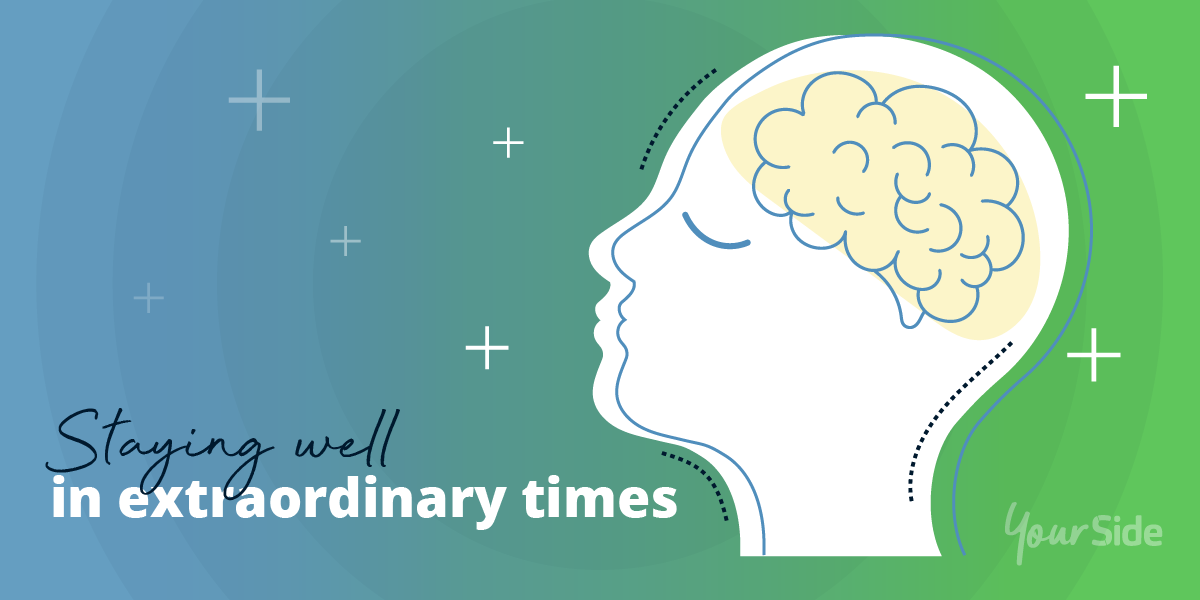Staying well in extraordinary times

Your Side’s Senior Counsellor Tarja Malone on staying well in extraordinary times
For many families the holiday season can be a challenging time anyway as there are so many expectations placed on families to be the happy, well-adjusted family celebrating together. This is often not the reality. These family times can bring to the forefront unresolved tensions and difficulties. For families who are supporting people with complex needs, this time of the year can be particularly difficult. To add the COVID-19 situation to the mix has just increased the pressure on families and added to the challenges they have faced. Further to this, people within our communities may have been worried about their families in other countries where COVID-19 is causing havoc or they might in fact have not had time with their families from overseas or across Australian borders for a very long time. The sense of isolation and worry can become overwhelming at times when families get together.
Undoubtedly, we are going through an incredibly uncertain time globally right now. As humans when we are faced with this level of uncertainty it is very normal for us to feel a range of impacts. These can range from being unsettled and a little uncomfortable, to more serious impacts like anxiety, panic attacks and depression and relationship ruptures, unemployment, financial hardship etc.
What can we do?
This is a time for us as humans to be able to change some of the social constructs of the past that have stopped us from being openly vulnerable. When we say to others, I am impacted by this in this way, we are also giving permission for others to share their experiences. This connects us as humans and normalises what is happening for us and hopefully helps us to increase our empathy for others.
What we have in common is that we are humans who reside on the planet earth. However we also need to recognise that things are very different for us all. These differences vary because of our social, economic, environmental, political situations and our sense of safety and connection to others, as well as our communities and the resources in our communities and families to ride out the challenges we are facing. It is a time to have empathy for others, because we never know what a person is managing or coping with just by looking at them. Kindness, compassion and care are what we need as human beings right now.
The messages we want to share with people are:
- It is very normal for people to feel distressing feelings currently
- It is an unprecedented global, national and local challenge not seen in our history
- Understand that everyone is experiencing this differently
- Don’t assume that you know what is happening for people
- Meet each person with an openness to their experience and be kind
- Reach out yourself and express some of the challenges you are facing even if it seems that others are doing it tougher
- It is ok for you to have your feelings and experience
- Understand that there is a difference between a logical rational approach to this and the emotional experience of it for people
- Having a space to share your emotional experience and impacts is important
- If someone is sharing this with you, don’t feel you have to make it better but bearing witness to what their experience is and listening deeply and compassionately is often exactly what is needed
- It takes courage to open up and it is a privilege for someone to share their pain, distress and their worries with you. It shows they trust you and it requires a respectful caring response
At the same time it is important to know when you are not able to give to other people. Compartmentalising some of the bad news is a good strategy for managing the overwhelm that can happen when digesting news and media content on a daily basis, and people sharing their distress and worry is added to that. Taking time out away from problems and focusing on every day things can help some people. Daily routines that focus on wellbeing help. Connecting with people, taking care of nutrition and exercise, having enough rest and finding moments to be present in the world are all good strategies for personal wellbeing.
You can see Tarja’s staff profile here.
